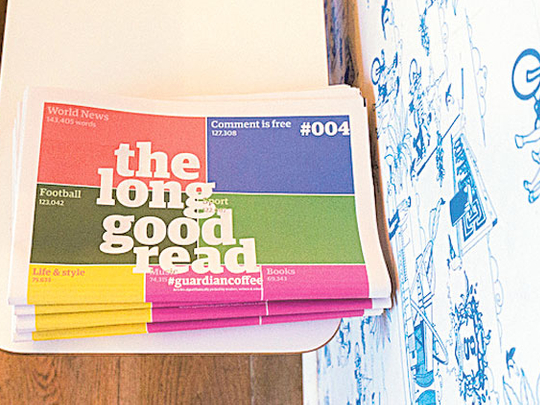
Everyone knows that people don’t have time to spend reading long text. The Guardian started an experimental publication called ‘The Long Good Read’ and the novelty stems from a collection of algorithms and programmes that both select the paper’s stories and lay them out on the page.
The Guardian uses analytics tools which tracks what readers are looking at, combined with various other factors from the readers taste to make the final selection of stories to be published.
The robot presents the Top 30 articles, about 1 per cent of all articles originally published by the Guardian in a week.
A “human” editor can the cast the stories with their editorial eyes across the selection and taking into consideration the date and relevance. ‘The Long Good Read’ is done in partnership with The Newspaper Club, responsible for the layout programme, which can feed in content from different sources, including links or individual text and images automatically.
The circulation is small, around 500 copies distributed free at an East London coffee shop each week.
Newspaper Club is a service to help anyone make and print their own publication. “We’re straddling two worlds: the nostalgia for print and those beautiful machines, the rudiments of it all and the slightly more weird media future that is going on,” said a spokesperson. “It’s not as simple as ‘The Internet will replace print.’ The future is way more complicated than that.”
Narrative Science
More than collecting data according to reader preferences, imagine if a computer can turns data into stories? Narrative Science, a Chicago-based start-up, has developed a platform that uses artificial intelligence to turn structured data into human-readable narratives focused on niche markets.
Content can be produced in many formats, including business reports, articles, summaries, visualisations, headlines and tweets.
Some clients, including Forbes magazine, uses the computer intelligence to find the stock data profile of notably performing companies.
Don’t start thinking that now computers can replace paid writers. But think about having a large data and information bank that will still need a human to understand it and make it useful for readers.









